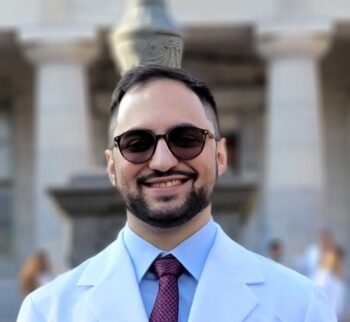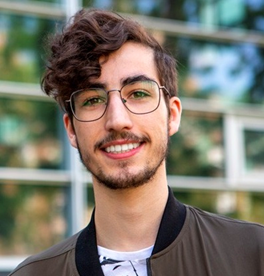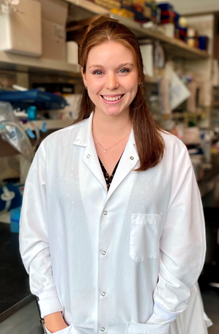When the most recent round of Vanier Canada Graduate Scholarships were announced earlier this year, Ă山ǿĽé students fared well, withĚý. The Faculty of Medicine and Health Sciences was particularly well represented in nine of the prestigious scholarships, with six of those being current MDCM-PhD students – the most of any MD-PhD program in Canada.
Given some time to reflect, the six MDCM-PhD students shared some of their thoughts about being selected as Vanier Scholars, their research and why they chose to study at Ă山ǿĽé. Learn more about each below.
 Zaid Al-Azzawi
Zaid Al-Azzawi
Can you tell us about your research?
Parkinson’s Disease (PD) is the second leading cause of neurodegenerative disease affecting the brain with more than 100,000 Canadians currently living with the disease. Patients suffer from symptoms in mental ability and mobility such as depression and slowness of movement, respectively.
Alpha-synuclein (αSyn) is a protein in the brain which clusters together in PD in a process called aggregation. Aggregation of αSyn is thought to cause much of the damage observed in PD patients’ brains. However, in different PD patients, αSyn can behave very differently.
Effective therapies to hinder PD or reverse the damage have been sorely lacking, and this may be explained, in part, because many models used to study PD and develop therapeutics have not yet addressed specific differences in αSyn aggregates that form in different patients. Therefore, there is a need for better models and a personalized approach to studying PD.
My project proposes the use of 3D organoids: a miniature brain-like structure composed of cells collected directly from PD patients. Using organoids carrying mutations in the SNCA gene (responsible for producing αSyn) permits us to understand how a specific patient’s genetics affect the aggregation behavior of αSyn. Using biochemical techniques, aggregation of αSyn will be analyzed to compare what occurs when αSyn is in abundance, depleted, or under normal conditions. Furthermore, different αSyn aggregates will be visualized via advanced microscopy techniques to analyze them structurally.
PD is different from patient to patient, and much of this difference could be due to the differences in αSyn aggregation. Using organoids from PD patients with SNCA mutations, we can begin to tailor our approach to understanding PD. This is the first project of its kind to attempt such a feat, and if successful, it can be an important stepping-stone towards developing effective and personalized treatments to PD.
What makes Ă山ǿĽé a good place to pursue your research? Why did you choose Ă山ǿĽé?
I specifically chose Ă山ǿĽé to pursue my PhD research because of the infrastructure and expertise that is present to enhance my training experience. Ă山ǿĽé is home to The Neuro: a world-renowned international hub for the study of neurodegenerative diseases. This makes Ă山ǿĽé the ideal training environment for research both by the bench and clinically. My own project relies on the expertise of multiple hubs and platforms like the Early Drug Discovery Unit and the Quebec Parkinson Network that are easily accessible due to the organic collaborations that are already existing at Ă山ǿĽé.
What does it mean to you to be selected as a Vanier Scholar this year?
It’s one of my greatest and proudest achievements. It validates all the hard work and learning that I have accomplished thus far to reach this point. However, besides being a prestigious award, the Vanier affords me the privilege and opportunity to carry out research without worrying about funding my PhD experience. Being an out-of-province student in Quebec and choosing to do the PhD comes at a significant cost, and the Vanier has helped me with reducing some of that cost.
 Mimosa Luigi
Mimosa Luigi
Can you tell us about your research?
My research aims to prevent violence in secure psychiatric hospitals, for the benefit of patients, the professionals who care for them and wider public safety.
While most people with a mental illness will NOT act violently, psychiatric hospitals, and especially secure hospitals which care for patients with a judicial or violent background, are especially high-risk environments.
During my PhD, I am conducting four studies which look at the assessment tools and the processes our clinical teams use to evaluate risk and then choose what psychological interventions are most likely to work for patients. In these studies, I will interview professionals who work in these hospitals, analyze patient charts, review literature on how to collaborate with patients and validate a new tool which is being implemented in Quebec.
My doctoral work will help make these environments safer and hopefully improve care experiences for this vulnerable patient population.
What makes Ă山ǿĽé a good place to pursue your research? Why did you choose Ă山ǿĽé?
ĚýĂ山ǿĽé’s MD-PhD Program is the ideal program for me to train as a future physician all the while gaining advanced research skills to conduct impactful clinical research.
I am conducting my doctoral research at the largest secure hospital in Canada, the Institut national en psychiatrie légale Philippe-Pinel. Supervised by its Director of Research and Academics and Canada Research Chair in Mental Health, Justice, and Safety – Anne Crocker, my project is supported by her internationally renowned expertise in translating research into health policy and in training scientific leaders at the intersection of justice and mental health.
What does it mean to you to be selected as a Vanier Scholar this year?
As the first scientist and medical student in my family, it has been an honour to be selected for a Vanier Scholarship this year. Receiving this award has not only been a validation of my dedication for this research and potential as a scholar, but also reaffirmed how important it is to conduct evidence-based research in the behavioural and mental health fields.
As a Vanier Scholar, I’m grateful to have the platform to bring constructive attention to the healthcare needs of persons who live with a mental illness and the consequences of judicialization. My leadership is centred around creating partnerships with diverse stakeholders in health and justice, building capacity in others, and continuously learning from patients – I’m thrilled that these values have been supported by the Canadian Institutes of Health Research and committed to continue making a positive impact as a future physician-scientist.
 Julia Luo
Julia Luo
Can you tell us about your research?
My PhD research in the Langlais lab focuses on understanding how our innate immune system fights against infection. The innate immune system is part of our first line of defense to disease and the normal functioning of those cells are necessary to human health. Nearly all disease involves the immune system in some way and in better understanding it we can ultimately better our treatment of infectious diseases and immune disorders.
What makes Ă山ǿĽé a good place to pursue your research? And why did you choose Ă山ǿĽé?
For my MD-PhD, I wanted to be able to acquire the expertise to bridge the space between basic science, computational analyses and medicine. It is in this type cross-disciplinary space in which I hope to be able to situate my work in the future and it was this goal that informed my choice to train here at Ă山ǿĽé. The Langlais lab uses both bench and computational techniques to answer interesting immunologic questions and Ă山ǿĽé is a leading research institution with a large network of academic research and clinical centres that allow for exciting collaborations to happen. In this environment, I saw a great opportunity to pursue my research interests and academic/medical training.
What does it mean to you to be selected as a Vanier Scholar this year?
I am incredibly grateful to have been recognized with the Vanier Canada Graduate Scholarship and am excited to use this opportunity to further my research in understanding our immune system. It has given me confidence and reinforces my motivation to continue pursuing my goal of working as a physician-scientist in immune diseases research.
 Michael Luo
Michael Luo
Can you tell us about your research?
Each year 1,600 Canadians are diagnosed with glioblastoma, a brain cancer that does not have effective treatments. Despite best available treatments, most patients pass away within two years.Ěý Current treatments are failing because they are not effective against cancer stem cells, which have the ability to divide endlessly and reform the tumour after treatment. Learning more about these cancer stem cells is keyĚýto developing better treatments.
Cancer stem cells can be thought of like seeds that need the right soil and environmental conditions to grow. My research aims to understand what these conditions are. Using that information, we can then come up with new drugs that figuratively target glioblastoma at its roots.
What makes Ă山ǿĽé a good place to pursue your research? Why did you choose Ă山ǿĽé?
I chose Ă山ǿĽé for my MD-PhD because of the supportive environment and the many opportunities to take part in innovative research. From my visits during the open house and interview, it was clear that the MD-PhD students were a close-knit community that supported one another. When I was starting the program, I received a lot of mentorship and advice from the senior students and that helped jumpstart my research.
The culture of supportiveness and collaboration is one of the major strengths of Ă山ǿĽé’s MD-PhD program. In terms of research, I was drawn to the opportunity to learn cutting edge technologies. For example, The Neuro was one of the first in Canada to adopt a new genome sequencing technology which is emerging as a major trend in cancer biology, neuroscience and pathology. I have the opportunity to learn the most up to date methods and technologies so I feel I will be well prepared for a career in research once I graduate.
 Etienne Maes
Etienne Maes
Can you tell us about your research?
My research focuses on characterizing the neural circuits in the brain that are essential for cognition and the encoding of memory. Treatment options in Neurology and Psychiatry are crippled compared to other specialties as we lack a fundamental understanding of how the brain works, and therefore cannot develop highly effective therapies. My hope is to provide a physiological basis for cognitive processes often impaired and generally thought untreatable in neurological and psychiatric disorders. Only once we have a clear understanding of which neural circuits are critical for specific cognitive processes can we begin to develop targeted and effective treatments for cognitive impairment.
What makes Ă山ǿĽé a good place to pursue your research? Why did you choose Ă山ǿĽé?
Ă山ǿĽé is a great place to pursue an MD-PhD due to both its amazing medical school, as well as many affiliated research centres and hospitals, all while being in the heart of one of the greatest cities in North America. Ă山ǿĽé has historically been a hub for Neuroscience, hosting collaborative work between clinicians and basic scientists, making it the perfect place for me to pursue my PhD.
What does it mean to you to be selected as a Vanier Scholar this year?
I am extremely grateful to have been selected as a Vanier Scholar, it makes me happy to know that others also believe in my research project and goals. It acts as a vote of confidence that is immensely helpful on the long MD-PhD journey.
 Sarah Maritan
Sarah Maritan
Can you tell us about your research?
My doctoral research focuses on a subtype of brain cancer known as brain metastases. These are cancers that start elsewhere in the body and travel to the brain, which are estimated to occur in nearly one third of patients with cancer. Our research group has shown that brain metastases can grow in two distinct patterns in the brain: either with cancer cells extensively invading out into the brain – which is associated with particularly poor patient outcomes – or as a single mass that does not invade outwards. Using patient samples collected during surgery, we will study how invasive and non-invasive brain metastases differ in how they interact with neighbouring healthy brain cells. Based on these differences, we aim to identify new therapeutic strategies for better clinical management for patients with brain metastases.
What makes Ă山ǿĽé a good place to pursue your research? Why did you choose Ă山ǿĽé?
Ă山ǿĽé continues to amaze me by how interconnected the research environment is with the clinical hospital network. My project relies heavily on brain tumour tissue generously donated by patients, which we work closely with neurosurgeon-scientist Kevin Petrecca, MD, PhD, to collect. Clinical collaborations make projects like mine possible, and I am grateful that Ă山ǿĽé provides an environment conducive for this type of translational research.
When I was applying to MD-PhD programs, Ă山ǿĽé’s program stood out to me for its strong MD-PhD student community. I particularly appreciated that there was an established bi-weekly seminar series and structured support network to help with the transitions between the MD and PhD, and back again.
What does it mean to you to be selected as a Vanier Scholar this year?
Graduate school can be challenging in so many ways, so receiving this award not only provides financial support for my research, but also encouragement that I am on the right training path. Additionally, receiving this award alongside so many of my MD-PhD peers showcases Canada’s investment in clinician-scientist trainees at the national level. I am hopeful that this investment continues both for MD-PhD programs nationwide and for translational research in general.
